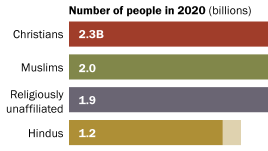
Many Religious ‘Nones’ Around the World Hold Spiritual Beliefs
Despite their nonreligious identity, many unaffiliated adults hold spiritual or religious beliefs. About a fifth or more in 22 countries believe in an afterlife, for example.
Numbers, Facts and Trends Shaping Your World
Despite their nonreligious identity, many unaffiliated adults hold spiritual or religious beliefs. About a fifth or more in 22 countries believe in an afterlife, for example.
All
Publications
Washington, May 7, 2014 — Although most Hispanics in the United States continue to belong to the Roman Catholic Church, the Catholic share of the Hispanic population is declining, while rising numbers of Hispanics say they are Protestant or unaffiliated with any religion. Indeed, nearly one-in-four Hispanic adults (24%) are now former Catholics, according to […]
A major survey of U.S. Hispanics conducted by the Pew Research Center asked more than 5,000 respondents about their religious, social and political views. See how their responses compare to the U.S. general public, and note the differences within the Hispanic population among four major religious groups.
Christians remain the largest religious group, and Muslims grew the fastest from 2010 to 2020. Read how the global share of Buddhists, Hindus, Jews and the religiously unaffiliated changed.
Most who use astrology (or a horoscope), tarot cards or a fortune teller say they do so just for fun rather than for insights about life.
After years of decline, the U.S. Christian share now shows signs of leveling off. The new Religious Landscape Study explores trends in identity, beliefs and practices.
The Global Religious Futures (GRF) project is jointly funded by The Pew Charitable Trusts and The John Templeton Foundation. Here are some big-picture findings from the GRF, together with context from other Pew Research Center studies.




